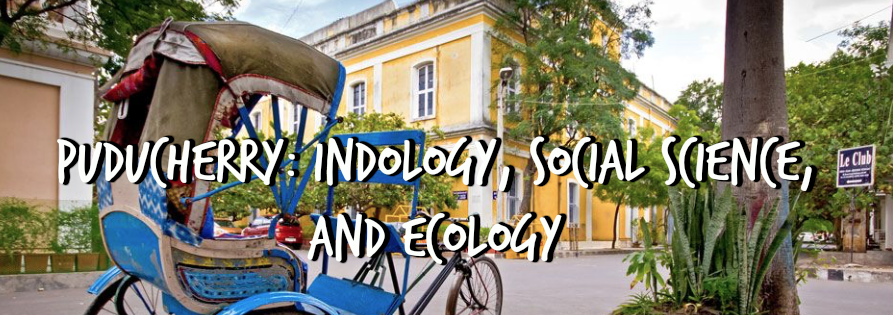
Dates: Between June 1 - August 11
Place: Puducherry, India
Apply here! For questions contact Sharifa Halimi at shalimi@sas.upenn.edu
Puducherry (previously known as Pondicherry), a French colonial settlement in India until 1954, is now a Union Territory nestled in the southeastern state of Tamil Nadu. Pondicherry has a fascinating mix of Tamil cultural heritage and French colonial history. The historic neighborhood of the French Quarter is known for its tree-lined streets, colonial villas and chic boutiques. A seaside promenade on the edge of town runs along the Bay of Bengal and is host to cafés, restaurants and parks. Pondicherry is a three-hour drive from the metropolis of Chennai and 20 minutes from the alternative intentional community of Auroville.
Host Institution: The French Institute of Pondicherry (IFP) is a research institution under the joint supervision of the French Ministry of Foreign Affairs and international Development (MAEDI) and the French National Centre for Scientific Research (CNRS). The institute hosts research projects spread over ten orientations: •Indology (including Indian analyses of Sanskrit language and literature, history of religions, Tamil studies) •Social Sciences (includes topics such as health and societies, economy and societies, environment and societies) and • Ecology (with researching focusing on the paleoenvironments of South India, application of new information technologies for strengthening of taxonomic expertise, biodiversity elements in the Western Ghats, Usage of biodiversity and ecosystems modified by human activity.
DEPARTMENT OF INDOLOGY ( KEYWORDS AND THEMATIC FIELDS):
Sanskrit or Tamil studies: History of Shaivism, Indian Philosophy and Aesthetics, Sanskrit Grammar and Manuscriptology
Research projects which could host students from June to August 2024:
- Transcribing Indian Cultural Knowledge and Heritage.
- Building interdisciplinary knowledge base and capacities around siddha medicinal texts on holistic medicine, wellness and ecological conservation.
Śaiva Ritual Manual: MRIGENDRAPADDHATITIKA
https://www.ifpindia.org/projects/saiva-ritual-manual-mrigendrapaddhatitika/
Descriptive Catalogue of Manuscripts
https://www.ifpindia.org/projects/descriptive-catalogue-of-manuscripts/
DEPARTMENT OF ECOLOGY ( KEYWORDS AND THEMATIC FIELDS):
Botany, Forestry ecology, Paleoecology or plant conservation, Biodiversity and conservation.
Research projects which could host students from June to August 2024:
Filling data gaps with the natural history collections of the Western Ghats https://www.ifpindia.org/projects/filling-data-gaps-with-the-natural-history-collections-of-the-western-ghats/
Protection of pollinators and agroecological transition in the Pondicherry region (POLLIN) https://www.ifpindia.org/projects/pollin/
Biodiversity Characterization at Community Level using Earth Observation Data https://www.ifpindia.org/projects/biodiversity-characterization-community-level-using-earth-observation-data/
Social-Ecological Dynamics in Rapid Economic Development: Infrastructure and coastal Change in South-eastern Sri Lanka https://www.ifpindia.org/projects/social-ecological-dynamics-in-rapid-economic-development-infrastructure-and-coastal-change-in-south-eastern-sri-lanka/
Western Ghats Portal / India Biodiversity Portal https://www.ifpindia.org/projects/western-ghats-portal-india-biodiversity-portal/
RUSE - Urban and Socio-ecological Resilience of Pondicherry Bioregion https://www.ifpindia.org/projects/ruse/
Please also refer to the IFP website to see the list of all the research topics and projects.
DEPARTMENT OF SOCIAL SCIENCES ( KEYWORDS AND THEMATIC FIELDS):
Urban Studies; Labour Studies; Rural and Peasant Studies (agricultural labourers and farmers livelihoods, sustainable agriculture, agroecological practices, adaptation of agriculture to climate change, etc.); Local Food Systems; History of Indian society; Environmental Law; Health and environment
Research projects which could host students from June to August 2024:
Contemporary tamil culture, politics, literature and classical tamil studies: https://www.ifpindia.org/projects/contemporary-tamil-culture/
Coastal Transformations and Fisher wellbeing
“Urbanizing Chennai: The role of urban peripheries in steering economic growth and pursuing sustainability” https://www.ifpindia.org/projects/urbanizing-chennai-the-role-of-urban-peripheries-in-steering-economic-growth-and-pursuing-sustainability-0/
Coordinating local food projects for the promotion of food equity
Sustainable Biochars – Carbon Sequestration to Mitigate Climate Change in Tropical Soil-Plant Systems
DEPARTMENT OF GEOMATICS ( KEYWORDS AND THEMATIC FIELDS):
Geospatial technology; Spatial monitoring and observations of vegetation changes; coastal zone management; Information technology: aggregation, analysis and dissemination of multidisciplinary scientific data in an open scientific paradigm.
Research projects which could host students from June to August 2024: Most of this department’s projects are interdisciplinary projects, hence they are not repeating here and have provided only the below ones. Please also refer to the IFP website to see the list of all the research topics and projects
- Evolution of a mangrove restoration project in the Philippines (FFEM)
- Development of Biogeographic Information System For West Coast of India
Mentor: Students will be placed with mentors based on research interest, after they have been accepted into the program. Students will be able to create their own research project related to above topics, or participate in field work already being conducted.
Program Dates: Between June 1 - August 11
Program Length: 8 Weeks
Housing: Students will find their own housing. SAC can assist in the search.
Apply here! For questions, contact Sharifa Halimi at shalimi@sas.upenn.edu
APPLICATION DEADLINE: March 1, 2024, 11:59 PM EST
